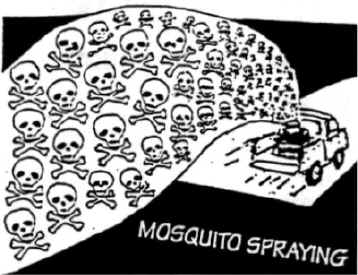 |
No Spray News James Irwin |
 |
No Spray News James Irwin |
April 15, 2002 Page 2
Questions About Permethrin and Gulf War SyndromeOne theory for the cause of Gulf War syndrome, which over 30,000 veterans have claimed to be suffering from, hypothesizes that an interaction between permethrin, insect repellent, and an anti-nerve gas drug is responsible.
The Immunomodulatory Effects of the Chemicals Used During the Gulf War
Janet L. Karlix *, Becky
Freiburger *, James Hoy**, Ian R.Tebbett IR***,
Donna Wielbo ***, Frans van Haaren **, Charles Schmidt ****
*Department of Pharmacy Practice, College of Pharmacy
** Department of Psychology, College of Liberal Arts and Sciences
*** Department of Medicinal Chemistry, College of Pharmacy
****Department of Environmental Engineering Sciences, University of Florida
The Gulf War Syndrome is a complex group of signs and symptoms which has plagued thousands of veterans who served during the Persian War. The exact etiology is unclear, however clinical presentation is often similar to the chronic fatigue syndrome which may contain an immunopathophyiological component. Therefore, this study was undertaken to investigate whether certain chemicals that soldiers were exposed to during the Gulf War possess any immunomodulatory effects. Human lymphocytes were isolated and exposed to varying concentrations of permethrin [perm], pyridostigmine [Pb] and DEET. The human lymphocytes were stimulated via mitogens PMA [phorbol-12-myristate 13-acetate], PHA [phytohemagglutinin], and MLR [mixed lymphocyte response] and immune response was measured either as immunostimulation or immunosuppression.
All three agents demonstrated a dose dependent response. Perm and DEET showed the greatest imnunomodulatory activity with statistical differences against controls in the PMA, PHA and MLR as measured by cpm. Perrn IC50's were 4.8 ug/ml PMA, 7.5 PHA and 46 ug/ml MLR. DEET was not as potent as Perm with IC50's of 100 ug/mg PMA, 95 ug/ml PHA and 50 ug/ml MLR. In contrast to the other agents, PB did not reach an IC50 but showed immunostimulation at low concentrations. All three agents demonstrated immunomodulatory effects that must be considered when addressing the pathophysiology of the Gulf War Syndrome.
Key words: Pyridostigmine bromide, DEET, Permethrin, Immune
Acknowledgement: Study supported by a grant funded through United States Department of Defense [Grant # DAMD 17-96-1-6036]
http://www.gulflink.osd.mil/medical/karlix.html
Permethrin is listed by the EPA as a "possible carcinogen."
Extonet also reports that:
Organ toxicity: Permethrin is suspected of causing liver enlargement of the liver and nerve damage [9].